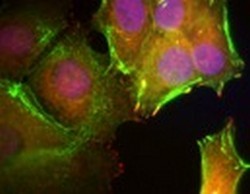IGF signalling in cancer
IGF-1R, widely expressed in human tissues, can also promote the growth and invasiveness of cancer cells. A number of inhibitors have been tested in clinical trials with disappointing results that do not match their pre-clinical evaluation. This highlighted the urgent need for biomarkers that measure IGF-1R activity in cancer, to select patients that might benefit most from IGF-1R inhibition. In addition, it became apparent that the IGF-1R participates in adaptive resistance to inhibitors of its own signalling pathway as well as to other drugs. Currently, there are no reliable methods to predict which patients or kinds of cancer will respond to IGF-1R inhibitors. In answer to this, the EU-funded BIOMARKERIGF (Identification of clinically useful biomarkers for IGF-I receptor signalling in cancer) project set out to develop models and reagents for testing candidate biomarkers of IGF activity in cancer. In addition, they used proprietary disease-specific arrays and genomic data sets of ovarian cancer to identify IGF-1 regulated genes. Results unveiled PDLIM2 as the only IGF-1 regulated gene to be associated with poor survival. High PDLIM2 levels are associated with poor survival in triple negative breast cancers and suppression of PDLIM2 reduced the invasive phenotype in breast cancer cell lines. In the second part of the project, researchers generated ovarian cell lines with high or low IGF-1R expression and performed RNA microarray profiling to identify differentially expressed genes. Using the same models, they discovered a subset of receptor and cellular kinases that mediated resistance to IGF signalling. Apart from scientific knowledge into IGF signalling, the findings of the BIOMARKERIGF study have clinical ramifications for the therapy of cancer. Given that IGF signalling is regulated by genetic, environmental and cellular factors, the identification of IGF biomarkers and modulators could contribute to healthy ageing.







